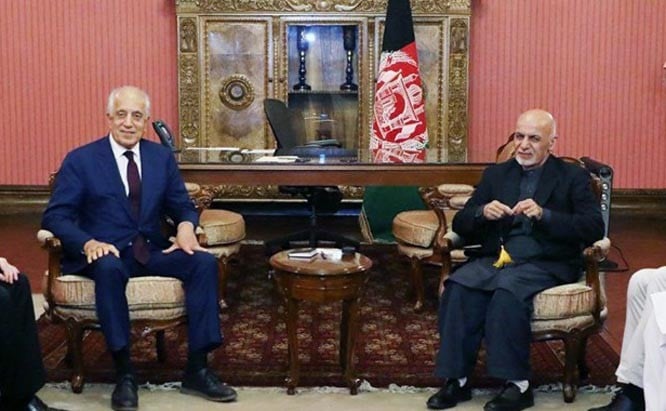
Despite the excitement that both US negotiators and Taliban have generated about the progress in talks, there are a number of hurdles that plague the peace process

Politics is unpredictable. Who could have predicted that after 17 long devastating years of conflict the US would be abandoning Afghanistan in the same mess that Washington was all determined to eliminate in the first place. Despite the excitement that both US negotiators and Taliban have generated about the progress in talks, there are a number of hurdles that plague the peace process -- a euphemism for American humiliating eviction from Afghanistan.
First, Taliban don’t treat the Afghan government as a party in the reconciliation process. Taliban spokesman Zabiullah Mujahid’s interview was premiered on March 9, 2019 in Zangari Maraka on Shamshad TV, an Afghan channel. The spokesman rejected outright the prospect of Taliban talking to the Afghan government, which he labelled as abettor of Americans and other occupiers in Afghanistan.
In line with Taliban stand, the spokesman dismissed Afghan President Ashraf Ghani as head of a government which was formed by Americans. Similarly, he also rejected the possibility of talking to Americans on intra-Afghan reconciliation, which he described as Afghanistan’s internal problem having nothing to do with Americans.
Secondly, the US approach to Afghan peace is at variance with that of Taliban’s. "Nothing is agreed until everything is agreed, and everything must include an intra-Afghan dialogue and comprehensive ceasefire" is a position Khalilzad has maintained since the start of the latest phase of talks. His scheme of peace negotiations includes (a) counterterrorism guarantees, (b) timeline for the withdrawal of international troops (c) intra-Afghan reconciliation talks that would involve Afghan government, Taliban and (d) a comprehensive ceasefire. On the last two points, Taliban are not giving in to the US position. In the interview, responding to a question on ceasefire, Mujahid said that these were Taliban battlefield victories that have forced Americans to talk to them and that Taliban don’t accede to a ceasefire.
Third, Kabul does not see eye to eye with the US modus operandi of the peace negotiations. After the end of the 16-day long fifth round of peace talks between the US and Taliban delegations in Doha, Khalilzad left for Washington to brief his American bosses. He didn’t feel the need to take the Afghan president into confidence by visiting Kabul first in which case he could have pitched his idea of peace to the president.
Without participation from Kabul, the US-Taliban peace negotiations have definitely been undermining the authority of Afghan National Unity Government. These unrepresentative talks have raised the spectre of the revival of the dark years of Taliban rule. Talk shows, publications, seminars and public gatherings depict Taliban as if they were knocking on the door of Kabul.
Probably, it was for the first time a high ranking Afghan official publically charged the US of betrayal albeit obliquely. Afghan National Security Adviser Humdullah Mohib -- a close aide to president -- while in Washington this March, accused Zalmay Khalilzad of ‘delegitimising’ the Afghan government. He charged Khalilzad with harbouring a long-cherished political ambition to rule Afghanistan.
"As ambassador in Kabul, Khalilzad functioned almost like a viceroy," maintained a story of The New York Times. Secretary of state for political affairs, David Hale told Mohib, who was summoned to the State Department, that "attacks on Ambassador Khalilzad are attacks on the department and serve only to hinder the bilateral relationship and the peace process."
Afghan President Ashraf Ghani’s grievances are understandable. Khalilzad came under scathing criticism because the view in Kabul is that the peace envoy has been keeping a tight rein on the peace process without taking Kabul on board, an anomaly in want of an answer. Additionally, as news of a likely interim administration is emerging, the negotiations are poised to kill Ghani’s reelection bid in presidential election slated for July of the year but likely to be postponed indefinitely.
Khalilzad is all set to head any interim administration, which will also include Taliban but may exclude Ghani, the view in Kabul seems running so. The reading of Khalilzad as an ambitious person isn’t without a reason. In 2009, Zalmay Khalilzad considered contesting presidential election against Hamid Karzai but he missed the May 8 filing deadline. At the time, the Obama administration opted not to get involved and left it to Khalilzad and Karzai to agree on any role that could have been assigned to Khalilzad. There was even weeks-long talk between Karzai and Khalilzad on taking a role on the latter’s part as an unelected chief executive of Afghanistan.
Fourth, even some of US NATO allies feel left out. Reuters spoke to 10 diplomats from countries that support Resolute Support in Afghanistan. They told the news organisation that war fatigue and being excluded from the peace talks are reasons that have hastened rethinking regarding their commitment to Afghan campaign. "If Qatari officials can be at the negotiating table, then how did the US forget to invite its key allies who have fought the Afghan war since 2001?" stated a diplomat interviewed by Reuters. Rectification is needed.
Taliban are desperate for immediate US withdrawal; so are their regional backers. But the complete withdrawal is premature, hence detrimental to the cause of peace in Afghanistan. The US should have a piecemeal approach to complete withdrawal conditioning it to Taliban participation in the Afghan political life in compliance with Afghan constitution while strengthening the Afghanistan central government through every possible means.